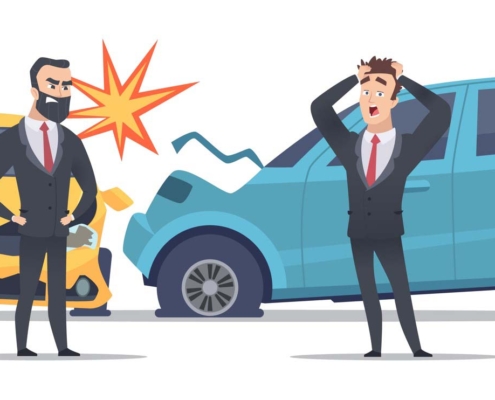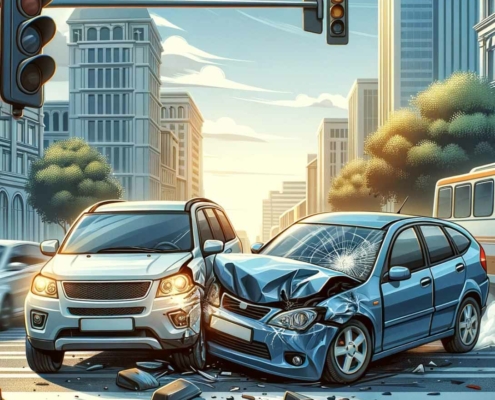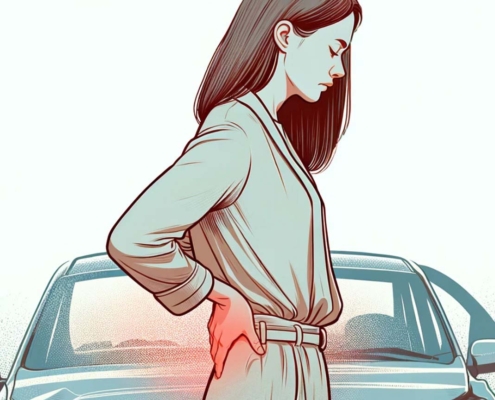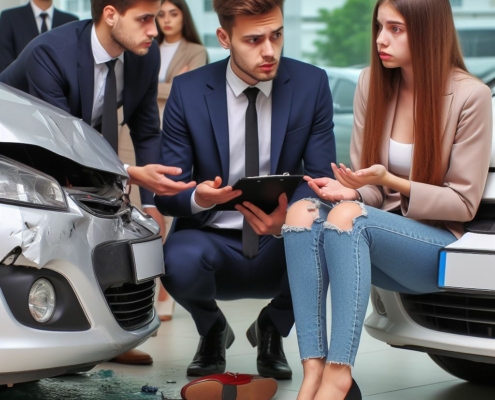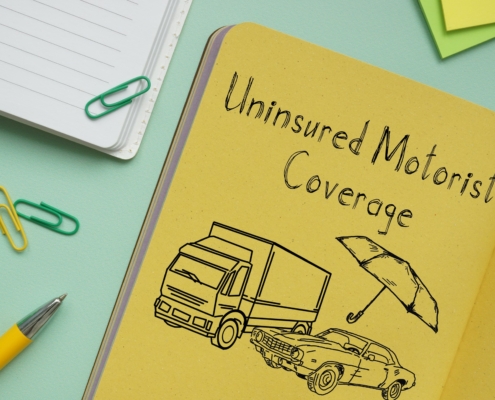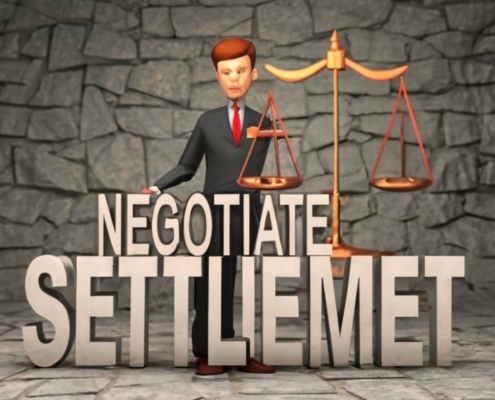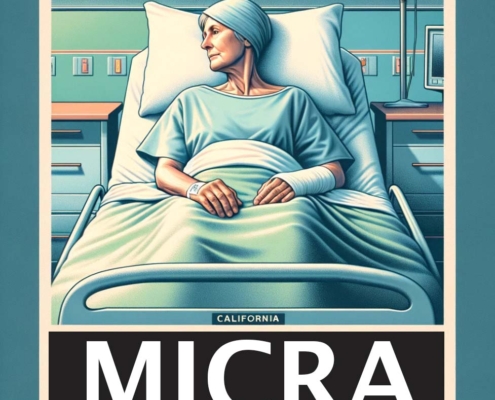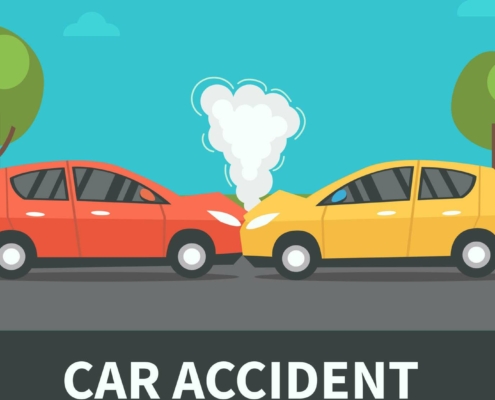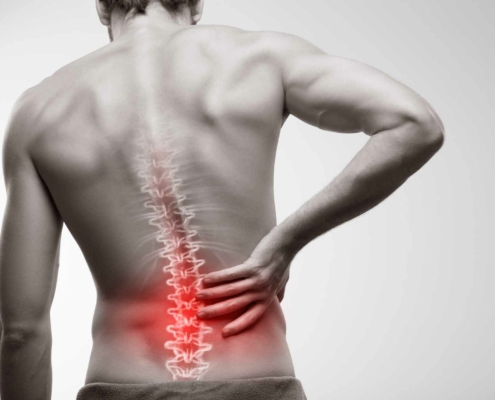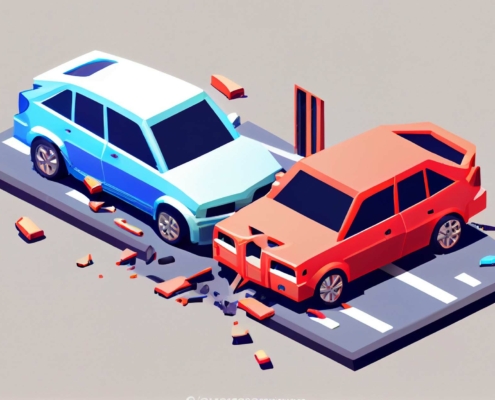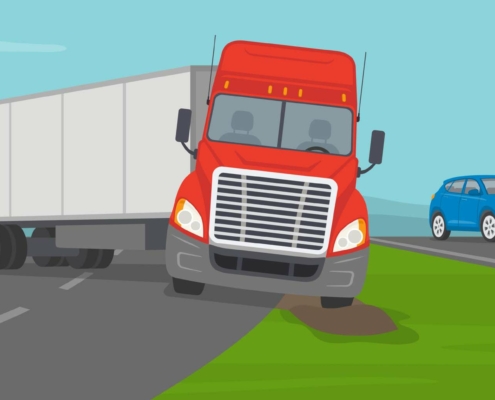What to do after a car accident
Operating a vehicle on California’s freeways can be dangerous. There is always a chance that you could get into a traffic accident when driving. Being prepared can help you avoid expensive blunders in any kind of accident, be it a minor fender bender or a serious injury collision. This article explains what to do following a car accident and what to anticipate from your insurance company claim. For legal advice after an accident, consider a consultation with a car accident insurance lawyer.This document includes a checklist for your convenience, which you may store in your car for future use.
When buying insurance, make sure the policy limits, coverages, and deductibles fit your needs by thoroughly reading the application before signing. Go over the declaration page as soon as you receive the policy. It lists the insured vehicles, provides crucial details on the covered drivers, and specifies the coverage limits and deductibles. Verify that the coverage matches what you ordered and that the information is accurate. Should modifications be required, submit a written request to your agent or the insurance provider and maintain a copy. To confirm that your documents have been received, use the certified mail return receipt requested.
Learn about your auto insurance policy so that you can comprehend it before you have to make a claim. To understand what is covered and what is not, carefully read the policy. Consulting a car accident insurance lawyer ensures your rights are protected after an accident.
How to Proceed in the Event of an Accident
What must I do at an accident scene?
Call 911 – Stop as soon as possible and only move when it is safe to do so. If there are injuries, dial 911.
Make a police report. Every accident scene may receive a response from police officials in certain places. They might take into account elements including the accident’s location and severity (some police departments won’t respond to an accident on private land). Still, you ought to try calling the cops. It’s also important to know that in most cases, policies mandate that if there is a hit-and-run accident, the police must be notified within a certain amount of time.
Ask every driver for their name, address, phone number, and driver’s license number. Obtain the vehicle identification number and the license plate(s). To ensure the accuracy of the information, request to see the driver’s license and any relevant car registrations. Identify any witnesses and other passengers by getting their names, addresses, and phone numbers. Take pictures of the damage and the accident area, including any visible obstructions like traffic controls, if you have a camera or a cellphone. The names and addresses of the drivers and owners of the involved cars should be left in a note if the owner of a damaged car or damaged property cannot be found.
Inform your insurance company and/or agent right away. You have ten days to notify the Department of Motor Vehicles of the accident if there are injuries or if the damage to the vehicle exceeds $750.00. Your driver’s license can be suspended if you don’t tell the DMV.
FAQs
What occurs once I submit a claim to my insurance provider?
Your insurance provider will get in touch with you to get more specific details about the accident and might even record or require a written statement. One may occasionally request an examination under oath. It is possible to get in touch with additional drivers and witnesses as part of the investigation. You must submit proof of your loss (injuries, medical bills, missed income, etc.) if you have an uninsured motorist claim or medical payments. Seek a car accident insurance lawyer to maximize your settlement from insurance companies. A skilled car accident insurance lawyer can dispute unfair claim denials effectively.
What should I do if I don’t hear from the insurance company?
As soon as you report the loss, a claim representative ought to get in touch with you. It is possible for the insurance company to contact you after up to fifteen days in some situations. If you don’t hear back, get help by calling your insurance provider or agent. Get in touch with the Department of Insurance if they don’t respond to you or if you think there is an unjustifiable delay in getting your claim settled. You may contact a car accident insurance lawyer specializes in getting fair compensation for accident victims.
How does the insurance provider assess damage to a car?
A certified adjuster or appraiser often examines the car damage. After that, based on the preliminary inspection, the adjuster or appraiser creates an estimate. The shop will get in touch with the insurance to request clearance for the extra cost of repairs if more damage is discovered during the repair procedure. Remember that the insurance company might dispatch an adjuster to reevaluate the extra damages. Instead, if the damage is not too severe, the business can ask you to provide comparative repair estimates. Recall that after you are happy with the final estimate and the repair facility, it is your job to sign and give the shop permission to fix your car.
Under a typical auto policy, how much will the company pay for a physical damage claim?
In most cases, the insurer will cover the lower of the following:
- The sum that will be required to fix the car or its actual cash value (ACV).
Check your policy to see what is and isn’t covered. Give special consideration to the limits and exclusions. For instance, unless they are Original Equipment installed by the car manufacturer (OEM), improved aftermarket stereos, phones, or tires and wheels typically have no or very little coverage. For such installed equipment, additional coverage is typically provided at an extra cost.
What is ACV, or actual cash value?
In California, actual cash value refers to fair market value, unless the policy specifies otherwise. The amount of money that a seller and potential buyer and are willing to pay and are reasonably aware of the asset’s worth is its fair market value. They must act independently of outside pressure to complete the transaction and in their own best interests.
What does appraisal provision mean?
The majority of standard plans have an appraisal clause. This can be useful if there is a disagreement about the price the insurance company is offering to settle your vehicle’s total loss. Check your policy if it has one by reading it. This clause allows you both to request an appraisal. Every side chooses a qualified appraiser. After that, the appraisers choose an impartial arbitrator. The appraisers present their disagreements to the umpire if they are unable to come to a mutually agreeable amount. Any sum that both parties decide upon is enforceable. The fee is split; the parties each pay their own appraiser.
How is the draft or check generated?
Any lienholder, including a bank or financing firm, as well as the insured may both have their names on the check. The repair facility may also be listed as a payee by the firm if the vehicle is determined to be repairable.
Who is in charge of an auto loan’s remaining balance?
Even in cases when the car is stolen or irreparably damaged, the borrower is still liable for the remaining loan sum. The lender will want you to make up the difference if the amount of your claim is less than the remaining loan debt. To guard against this circumstance, coverage frequently referred to as “gap” insurance can typically be obtained.
When my car is being repaired, will the insurance company cover the cost of a rental car?
In the event that you have rental car insurance. Before you rent a car, be sure you read your policy. The employer pays up to a certain sum per day for a predetermined number of days. However, policy limits differ. The coverage expires when the loss is covered, your car is fixed, or the predetermined amount of time passes, whichever happens first.
The coverage can cover transportation costs automatically in the event that your car is stolen. Check your policy once more just to be sure. Typically, this kind of coverage starts forty-eight hours following the theft and ends when the incident is cleared, your car is found, or a predetermined amount of time has passed, whichever happens first.
What is a collision damage waiver, and is the rental car company going to cover these costs?
During the time the customer has ownership of the vehicle, they are liable for any collision damage according to the conditions of the rental agreement. Furthermore, rental firms cover themselves for collision-related car damage. The rental business will forego all or part of the customer’s duty to pay repair costs for collision-related vehicle damage in exchange for an extra price. There are variations in the waiver’s phrasing as well as the fee amount. According to the terms of your personal motor insurance, the rental car may be covered for accident damage. Prior to renting a car, find out from your agent or the provider.
What does salvage value mean?
If your car is deemed a total loss, this is the amount that remains of the damage.
What does subrogation mean?
The insurance company’s right to recoup the full amount of damages it paid you from a third party is known as subrogation. For instance, your insurance company would request repayment from the other party if it pays for the damages to your automobile in an accident if you are at fault and you have a collision claim. Your assistance with the company’s subrogation attempts is required by policy. Furthermore, nothing you do may compromise the business’s right to recoup. You cannot, for instance, write a contract releasing the other party in return for paying your deductible.
Is it necessary for the insurance provider to assist me in getting my deductible back?
Yes and no. If subrogation is something the insurance company plans to pursue, they have to tell you. Your deductible must be part of the process if the firm decides to seek subrogation. To enable you to pursue your deductible independently, the company must notify you if it decides not to pursue subrogation. The majority of businesses will compensate you in line with the recovery if their efforts are effective, whether fully or partially.
For instance, you will get your deductible back in full if the entire paid claim is recovered. If only 65% of the claim is recovered, you will get the remaining 65% of your deductible. If recovery is achieved, the company and you will split any costs or fees (such as legal fees) incurred by the company throughout the recovery process. You may, however, pursue recovery from the other party directly on your own if you decide not to have the company reduce your deductible from its costs. To prevent endangering its recuperation, speak with your insurance provider about the situation before taking any action.
Is there coverage for the car outside of California?
The majority of insurance offers coverage in Canada, other states, and U.S. territories and possessions. In several states and territories, such as California, financial responsibility laws have been passed. These mandate that drivers carry a certain level of auto insurance to cover losses incurred from the ownership or operation of a motor vehicle. Your organization will fulfill the higher criteria if the financial obligation requirements where you are visiting exceed the limitations of your policy. It’s advisable to purchase Mexican auto insurance separately if you intend to drive your vehicle there as most policies do not offer coverage for it. Prior to your trip, confirm your out-of-state coverage.
The California Vehicle Code, Section 16020, is where the state’s financial responsibility legislation is laid forth. It mandates, among other things, that all drivers have the financial means to cover losses brought on by the ownership or use of a motor vehicle.
It is required of drivers to demonstrate their financial responsibility by demonstrating that they can pay damages. This means a minimum of $15,000 for each person killed or injured in an accident, $30,000 for the injuries or deaths of two or more people in one accident, and $5,000 for property damage in any one accident. You might be required to provide written documentation of your financial responsibilities if you get a moving infraction citation from a peace officer or are in an accident.
This can be accomplished by writing down the name of your insurance provider and policy number on the DMV-issued vehicle registration card. This insurance documentation needs to be stored in the car or in a location where it is easily accessible while driving. Get in touch with the California Department of Motor Vehicles for more details.
In the event that an accident leads to the serving of a lawsuit (Summons and Complaint), what should you do?
Inform your insurance provider and agent right away. Mail or deliver the original documents to your employer, keeping a copy for yourself. Refrain from making statements or discussing the accident with anybody other than an authorized corporate representative. Legal defense will be provided by your company if the lawsuit results from a covered loss.
Is a new vehicle covered?
The majority of policies offer automatic coverage for a car that takes the place of one that is currently covered. Usually, the coverage is the same as what you got with your last car. Anytime you get a replacement car, let your broker-agent know about it right away. Usually, you have to give your agent or your employer notice of your desire for additional coverage within a certain amount of time.
The majority of policies additionally offer automatic coverage for a car that you acquire and add to the list of vehicles that are already covered. Usually, there are prerequisites that need to be fulfilled.
If the insured wishes the new car to be covered under the current auto insurance, the majority of automatic coverage provisions require the insured to notify the insurer within thirty days of obtaining the new vehicle. Note that some policies may have shorter notice periods than thirty days. Certain insurance companies only give notice for a maximum of 14 days.
The vehicle will be uninsured if the insured does not notify the insurer of the recently purchased vehicle within the allotted time. An insured’s verbal notification to their insurance agent may be considered adequate to initiate automatic coverage for a recently purchased car, barring a special notice mechanism in the policy.
Things not to do after a car accident
- Avoid arguing with other passengers and drivers. Save your side of the story for the cops and your insurance provider.
- Never sign a pledge to assign blame or to reimburse the other party for losses.
- Don’t sign anything if the other party promises to cover your deductible.
- To the other driver or drivers, or to a police officer, you must present your driver’s license, vehicle registration card, proof of financial responsibility, and current address.
Contact a car accident insurance lawyers aiding victims financially.
Key Advice
- Go over your policies. Don’t hold off till after an accident.
- Ask your agent, the firm, or both for clarification if you have any questions about your policy.
- Give the police a call if you are in an accident. Dial 911 if there are any injuries.
- At the scene of the accident, gather as much information as you can to give to your insurance company, agent, or both.
- Report an accident right away to your insurance company, agent, or both.
- To support the insurance adjusters’ and investigators’ efforts, collaborate with them.
- Ask your agent or an agent of the insurance company to clarify any aspect of the claims process that you are unclear about.
- If your ownership of your car changes, you must notify your agent or firm in writing.
- After a collision, contacting a car accident insurance lawyer should be a priority.
Your Rights Under the Regulations Governing Fair Claims Settlement Practices
Generally speaking, insurance providers must accomplish the following:
- Inform you of all the features, restrictions, time constraints, and other terms of your insurance policy.
- After getting notification of the claim, acknowledge it, launch an inquiry, send out forms and instructions, and offer appropriate assistance as soon as possible—but no later than 15 days later. (A written or verbal notification to the insurance company that fairly informs them that you intend to file a claim is known as a notice of claim).
- React to correspondence from you as soon as possible, but no later than 15 days.
- Accept or reject the claim right away, but no later than 40 days after obtaining the claim’s supporting documentation. Documentation that you own that supports the claim and demonstrates the extent or value of the loss—such as repair estimates or police reports proving your car was stolen, among other things—is known as proof of claim.
- The insurer is required to cover fair towing costs, unless the insurer has given you the name of a particular towing firm before you use a towing facility.
- Make a just settlement offer. Taxes, license fees, and transfer fees must be included in the settlement if you lost everything. The amount settled must be equal to the cost of a comparable car of the same kind and caliber. Should you decide to keep the salvage, reasonable, quantifiable, and obvious deductions for salvage must be made from the settlement.
- After a claim is approved, the insurer needs to pay it out right away, but at most 30 days after the settlement was made.
- Let you know whether they plan to seek subrogation. Unless you have already recouped your deductible, the insurance company must add it if it seeks subrogation.
A car accident insurance lawyer can help you understand the intricacies of insurance policies and laws.
Fraud involving Auto Insurance
In the past, California has seen numerous types of car insurance fraud. Vehicle damage and auto accidents are the most prevalent fraud tactics.
One kind of fraud typically involves dishonest auto body and repair shops, as well as insured parties. These individuals may use a range of dubious or illegal tactics:
- Reporting vehicle parts as lost or damaged when, in reality, they were not.
- Making final costs exceed the initial damage estimate.
- Charging for unapproved repair work.
- Charging for original parts in cases where junk yard or aftermarket components were used.
- Pounding out dents or employing a bonding agent when billing for brand-new vehicle parts.
- Reporting car theft or vandalism on purpose in order to get insurance money.
To guard against possible fraud, it is crucial for customers to thoroughly go over all paperwork from auto body and repair firms. Customers should also be wary of any auto body or repair shop that directs them to law or medical offices. This behavior could be a sign of “capping.” This activity is a felony in California.
Organized car accident rings are frequently involved in automobile fraud. Car accidents that are staged, which are not accidents at all, stick to a number of fundamental plans, such as:
- Stopping suddenly for no obvious reason.
- Willfully ignoring the right-of-way.
- Ceding the right-of-way in order to create a collision.
- Passengers not in the car at the time of the accident are listed in the claims report.
- A list of witnesses who were not present at the accident scene is provided.
- Claimed injuries are more than car damage.
- The driver’s car is temporarily registered.
- Previous damage to the other car.
- A lawyer contacting you without asking.
Any unexpected referral to a body shop, law office, or medical office should be taken with caution if you have been in a car accident. Cappers and organized accident rings aggressively recruit members of the public to take part in fabricating accidents. These accidents—also known as “paper accidents”—often solely happen on paper and involve no innocent people. Paper accidents are becoming more common among fraudsters since they are less likely to result in physical harm and less likely to involve the authorities.
Car Body Repair Centers
A car’s repair shop of choice cannot be mandated by an insurance company under California Insurance Code Section 758.5. Still, an insurance provider may suggest that a car be fixed at a certain shop if the following legally stipulated circumstances are met:
- The customer expressly asks the insurance company to propose a repair shop.
- The customer has received written notice of their ability to choose the repair business of their choosing.
- The insurance company shall, at no additional expense, save as specified in the policy or as otherwise permitted by law, restore the damaged vehicle to its pre-accident or pre-loss condition if the policyholder consents to employ the recommended repair shop.
- If the customer accepts the company’s oral referral to a repair shop, the business is required by law to follow up on the recommendation with the required written notice within five calendar days.
- The insurance company will pay the reasonable costs of repairing the car in a shop of the customer’s choosing. This is provided that the repairs are performed in compliance with recognized industry standards for high-quality and skillfully constructed automobile repairs.
It is against the law for the insurance provider to restrict or minimize appropriate repair expenses by drawing conclusions about what would have happened if the car had been fixed at the provider’s preferred repair facility. Hiring a car accident insurance lawyer can expedite the claim process significantly.
If the car is not fixed correctly, the insurance company also has to support the suggested shop’s repairs. A car accident insurance lawyer can also handle negotiations with insurance adjusters.
Replacement Car Parts
After-market parts may occasionally be used to replace damaged parts during a car repair. Parts that are not produced by the original manufacturer are known as after-market parts. The quality of aftermarket components could match or surpass that of original equipment manufacturer (OEM) components. It is possible to fix your car with replacement components that were not made by the original equipment manufacturer, but they must be equivalent to OEM parts in terms of kind, quality, safety, fit, and performance. Customers need to be aware of the following:
Before beginning any repairs on the vehicle, an auto repair shop is required to produce a documented repair estimate of the cost of repairs. A formal repair invoice from the shop is required after the work is finished. According to state legislation, the repair invoice must specify the kind of vehicle parts that were utilized in the repairs. To be sure that the auto body shop has designated every auto part replaced as being used, reconditioned, rebuilt, after-market, or an original equipment manufacturer part (OEM), customers should carefully review their invoice.


